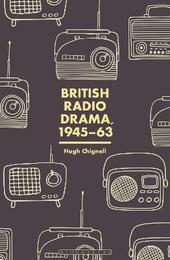
|
British Radio Drama, 1945-63
Hardback
Main Details
| Title |
British Radio Drama, 1945-63
|
| Authors and Contributors |
By (author) Professor Hugh Chignell
|
| Physical Properties |
| Format:Hardback | | Pages:200 | | Dimensions(mm): Height 229,Width 152 |
|
| Category/Genre | Radio |
|---|
| ISBN/Barcode |
9781501329692
|
| Classifications | Dewey:809.222 |
|---|
| Audience | | Tertiary Education (US: College) | |
|---|
|
Publishing Details |
| Publisher |
Bloomsbury Publishing Plc
|
| Imprint |
Bloomsbury Academic USA
|
| Publication Date |
19 September 2019 |
| Publication Country |
United States
|
Description
British Radio Drama, 1945-1963 reveals the quality and range of the avant-garde radio broadcasts from the 'golden age' of British radio drama. Turning away from the cautious and conservative programming that emerged in the UK immediately after World War II, young generations of radio producers looked to French theatre, introducing writers such as Samuel Beckett and Eugene Ionesco to British radio audiences. This 'theatre of the absurd' triggered a renaissance of writing and production featuring the work of Giles Cooper, Rhys Adrian and Harold Pinter, as well as the launch of the BBC Radiophonic Workshop. Based on primary archival research and interviews with former BBC staff, Hugh Chignell places this high-point in the BBC's history in the broader context of British post-war culture, as norms of morality and behavior were re-negotiated in the shadow of the Cold War, while at once establishing the internationalism of post-war radio and theatre.
Author Biography
Hugh Chignell is Professor of Media History and Director of the Centre for Media History at Bournemouth University, UK. He is the author of Key Concepts in Radio Studies (2009) and Public Issue Radio: Talks, News and Current Affairs in the Twentieth Century (2011) and co-editor of Regional Aesthetics: Mapping UK Media Cultures (2015, with Ieuan Franklin and Kristin Skoog).
ReviewsCompelling ... focused and succinct. * Journal of British Studies * [S]ucceeds both as a survey of relevant issues and as a series of case studies that evocatively explore the topic ... Chignell's book is great at isolating the particulars of this disappeared moment in cultural production, and it leaves the reader with the wish for archival discoveries of seemingly lost programmes in the years to come. * Historical Journal of Film, Radio and Television * A compelling account of the evolution of British radio drama and its key creative figures, during its most formative years. Essential reading for anyone interested in the highly productive relationship between theater, literature, poetry, dramatic innovation, and the art of radio. * Michele Hilmes, Professor Emerita, University of Wisconsin-Madison, USA * Grounded in a thorough familiarity with the texts and sounds of historical radio, and guided by the understanding that the reputedly conservative mid-century BBC was in fact a crucible of artistic experimentation, Hugh Chignell's elegantly written, meticulously detailed, wide-ranging study sets a new standard for the study of British radio drama during its Golden Age. Chignell is fascinated by how radio drama at this time reveals 'how post-war and cold war Britain was experienced.' Drama, Chignell shows, 'got it.' From the theater of the mind to the theater of the absurd, and from Samuel Beckett to John Osborne, Harold Pinter, J. B. Priestley, Giles Cooper and a slew of long-forgotten other artists in sound, Chignell brings a nuanced attunement to the social, political, institutional, technological and literary contexts within which radio drama flourished, achieving artistic successes that represent canonical moments not only in its own medium, but also in twentieth-century British cultural life. * Todd Avery, Professor of English, University of Massachusetts Lowell, USA *
|